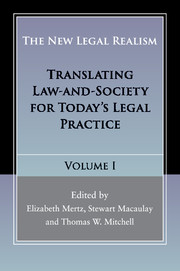Book contents
- Frontmatter
- Contents
- List of contributors
- Preface to The New Legal Realism, Volumes I and II
- 1 Introduction: New Legal Realism: Law and Social Science in the New Millennium
- Section I THE PLACE OF NEW LEGAL REALISM IN LEGAL THOUGHT AND TEACHING
- Section II PHILOSOPHY AND METHODS FOR A NEW LEGAL REALISM
- 6 Legal R/realism and Jurisprudence: Ten Theses
- 7 Legal Realism in Context
- 8 Legal Storytelling as a Variety of Legal Realism
- 9 Combining Methods for a New Synthesis in Law and Empirical Research
- Section III NEW LEGAL REALIST TRANSLATIONS
- Index
- References
9 - Combining Methods for a New Synthesis in Law and Empirical Research
from Section II - PHILOSOPHY AND METHODS FOR A NEW LEGAL REALISM
Published online by Cambridge University Press: 05 May 2016
- Frontmatter
- Contents
- List of contributors
- Preface to The New Legal Realism, Volumes I and II
- 1 Introduction: New Legal Realism: Law and Social Science in the New Millennium
- Section I THE PLACE OF NEW LEGAL REALISM IN LEGAL THOUGHT AND TEACHING
- Section II PHILOSOPHY AND METHODS FOR A NEW LEGAL REALISM
- 6 Legal R/realism and Jurisprudence: Ten Theses
- 7 Legal Realism in Context
- 8 Legal Storytelling as a Variety of Legal Realism
- 9 Combining Methods for a New Synthesis in Law and Empirical Research
- Section III NEW LEGAL REALIST TRANSLATIONS
- Index
- References
Summary
An unfortunate by-product of battles over prestige within law schools has been the frequent attempt to claim one particular method or field as the one and only source of empirical wisdom about law. This is particularly regrettable given that achieving a top-notch use of social science for understanding the workings of law at a practical level is (1) badly needed and (2) very difficult to achieve. Rather than wasting energy on turf battles, we urge, legal scholars should be turning their attentions to the still-neglected task of forging a truly interdisciplinary synthesis of methods and theories that would best serve the purposes of lawyers and jurists who need accurate information about law and society “on the ground.”
In this chapter, we add to a growing literature on why such a synthesis would be timely and helpful. In our view, the U.S. legal academy is well positioned to help the field of law in developing a unique interdisciplinary approach – if it is willing to work collaboratively with other parts of the academy and to move forward the project begun many decades ago by the original legal realists. Indeed, we argue, this conversation is already well underway, albeit under the radar of many traditional outlets for legal knowledge (at least in the United States, which is the arena with which we are most familiar). This is an opportunity to learn from a number of different but often-marginalized voices that have a lot to contribute, and from many generations of researchers from across the social sciences. At the same time, those social science researchers have often failed to consider the translation that is necessary if their findings are to be put to the best use in policy and “real-world” legal situations. And legal academics and practitioners are poised to provide guidance, if a cooperative ongoing discussion could be achieved.
Here, then, is a place where both legal and social science researchers have much to learn and to teach, if they can only find a common language in which to hold a shared conversation – about theory, and importantly also about method. Debates over methods in legal studies have just begun to take account of the many literatures that deal with issues of interdisciplinary translation from mixed-methods studies, science studies, and translation studies to other related fields.
- Type
- Chapter
- Information
- The New Legal RealismTranslating Law-and-Society for Today's Legal Practice, pp. 180 - 200Publisher: Cambridge University PressPrint publication year: 2016
References
- 1
- Cited by



